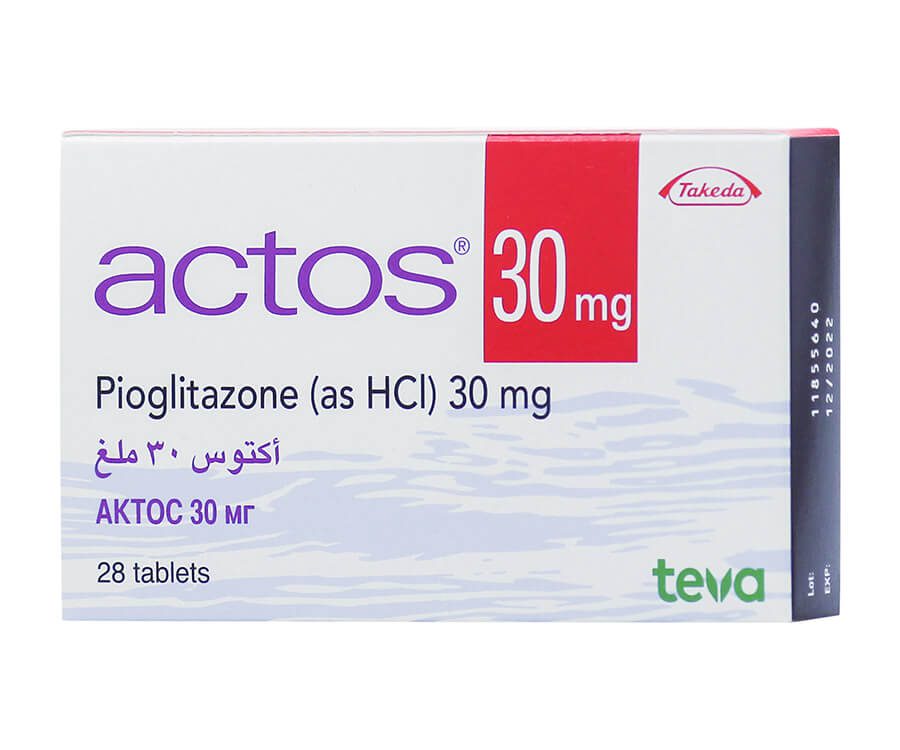
What Is Actos?
Actos, with the generic name pioglitazone, is an oral medication used to treat type 2 diabetes mellitus. It belongs to the thiazolidinedione class of drugs and works by improving the body’s sensitivity to insulin, a hormone that helps control blood sugar levels. Pioglitazone primarily acts on the body’s cells to enhance insulin utilization and reduce glucose production in the liver.
Approved by the U.S. Food and Drug Administration (FDA) in 1999, Actos is prescribed to help manage blood sugar levels in individuals with type 2 diabetes, particularly those who have not achieved adequate control through diet and exercise alone. It is often used as part of a comprehensive diabetes treatment plan, which may include lifestyle modifications and other antidiabetic medications.
While generally effective in controlling blood sugar, Actos is not without potential side effects. Common side effects may include weight gain, fluid retention, and an increased risk of fractures, especially in women. Long-term use of pioglitazone has been associated with an elevated risk of bladder cancer, prompting healthcare providers to carefully weigh the benefits and risks when prescribing this medication. As with any medication, individuals using Actos should be regularly monitored by healthcare professionals to ensure its continued safety and efficacy.
Brief History of Actos
Actos, with the generic name pioglitazone, has a history shaped by developments in the understanding and treatment of type 2 diabetes. Here’s a brief overview:
- Discovery and Development:
- Pioglitazone was developed by Takeda Pharmaceuticals, a Japanese pharmaceutical company. It belongs to the thiazolidinedione class of drugs, which target insulin resistance in the body.
- FDA Approval:
- Actos received approval from the U.S. Food and Drug Administration (FDA) in 1999 for the treatment of type 2 diabetes. It became available as an oral medication to help manage blood sugar levels.
- Mechanism of Action:
- Pioglitazone works by activating peroxisome proliferator-activated receptors (PPARs) in cells. This activation improves insulin sensitivity, allowing better regulation of blood sugar levels.
- Clinical Use and Popularity:
- Actos gained popularity as an effective oral antidiabetic medication. It was often prescribed to individuals with type 2 diabetes who needed additional treatment beyond lifestyle modifications.
- Safety Concerns:
- Over time, safety concerns emerged, particularly regarding an increased risk of heart failure and bladder cancer associated with long-term use of pioglitazone. Regulatory agencies issued warnings and updated safety information.
- Generic Availability:
- The patent for Actos expired, leading to the availability of generic versions of pioglitazone. This increased accessibility and affordability for patients.
- Regulatory Actions:
- Regulatory agencies, including the FDA, implemented measures to manage the risks associated with pioglitazone. Health professionals were advised to carefully assess the benefits and risks before prescribing the medication.
- Ongoing Research and Monitoring:
- Ongoing research continues to evaluate the safety and efficacy of pioglitazone. Healthcare providers closely monitor patients using this medication, considering individual health profiles.
Actos has played a significant role in the management of type 2 diabetes, providing an additional option for patients and healthcare professionals. Its history reflects the evolving landscape of diabetes treatment, with a focus on balancing therapeutic benefits and potential risks associated with long-term use.
| Year | Milestone |
|---|---|
| 1999 | FDA approval for Actos (pioglitazone) for type 2 diabetes. |
| Early 2000s | Actos becomes widely prescribed for managing blood sugar levels in individuals with type 2 diabetes. |
| 2007 | Safety concerns arise, particularly an increased risk of heart failure with long-term use of pioglitazone. Regulatory agencies issue warnings. |
| 2011 | FDA adds a warning about the potential risk of bladder cancer with long-term use of pioglitazone. |
| 2012 | Patent for Actos expires, leading to the availability of generic versions of pioglitazone. |
| Ongoing | Ongoing research and monitoring of pioglitazone’s safety and efficacy. Regulatory measures implemented to manage associated risks. |
This table provides a concise overview of key milestones in the history of Actos, highlighting FDA approvals, safety concerns, patent expiration, and ongoing regulatory actions and research related to pioglitazone.
How to Use Actos
It’s crucial to use Actos (pioglitazone) exactly as prescribed by your healthcare provider. Here are general guidelines on how to use Actos:
- Dosage:
- Follow your healthcare provider’s prescribed dosage. Typically, Actos is taken once daily, with or without food. The dosage may vary based on your individual health status and response to the medication.
- Consistency:
- Take Actos at the same time each day to maintain a consistent level of the medication in your system.
- Follow Instructions:
- Adhere to the specific instructions provided by your healthcare provider or outlined in the prescription label.
- Do Not Adjust Dosage Without Consultation:
- Do not adjust the dosage or stop taking Actos without consulting your healthcare provider. Abruptly stopping the medication can affect your blood sugar levels.
- Regular Monitoring:
- Your healthcare provider may order regular blood tests to monitor your response to Actos and assess any potential side effects. Attend all scheduled follow-up appointments.
- Lifestyle Changes:
- Actos is often part of a comprehensive treatment plan for type 2 diabetes, which may include lifestyle changes such as diet and exercise. Follow your healthcare provider’s recommendations for a healthy lifestyle.
- Notify Your Healthcare Provider:
- Inform your healthcare provider about all medications, supplements, or herbal remedies you are taking. Certain medications may interact with Actos.
- Symptoms of Low Blood Sugar:
- Be aware of symptoms of low blood sugar (hypoglycemia), such as sweating, shakiness, irritability, and dizziness. Keep a source of quick-acting sugar (like glucose tablets) with you in case hypoglycemia occurs.
- Potential Side Effects:
- Be aware of potential side effects and promptly report any unusual symptoms or concerns to your healthcare provider. These may include weight gain, edema (fluid retention), or signs of heart failure.
- Pregnancy and Breastfeeding:
- If you are pregnant, planning to become pregnant, or breastfeeding, discuss this with your healthcare provider. The use of Actos during pregnancy and breastfeeding should be carefully considered based on potential risks and benefits.
Always consult your healthcare provider if you have any questions or concerns about the use of Actos. Individual responses to medication can vary, and your healthcare provider will tailor the treatment plan to best meet your needs and minimize potential risks.
What Should Be Done If an Overdose Occurs?
If you suspect an overdose of Actos (pioglitazone) or experience symptoms of overdose, it is crucial to seek emergency medical attention immediately. An overdose of Actos can lead to severe complications, and prompt medical intervention is essential. Here are steps to take if an overdose occurs:
- Call Emergency Services:
- Dial emergency services (911 in the United States) immediately and inform them of the suspected overdose. Provide all necessary information, including the name of the medication (pioglitazone/Actos) and the estimated amount ingested.
- Do Not Wait:
- Time is critical in cases of overdose. Do not delay seeking medical assistance, even if symptoms seem mild initially.
- Symptom Management:
- While waiting for emergency services, if the individual is conscious and able to follow instructions, you can encourage them to rinse their mouth, but do not induce vomiting unless directed to do so by emergency personnel.
- Provide Information:
- If possible, provide information about the individual’s medical history, any pre-existing conditions, and a list of medications they are taking, including Actos.
- Bring Medication Packaging:
- If available, bring the packaging or container of Actos to the emergency room to help healthcare professionals assess the exact formulation and dosage.
- Emergency Room Evaluation:
- The individual will be evaluated in the emergency room, and appropriate medical interventions will be administered based on the severity of the overdose.
- Treatment of Symptoms:
- Treatment may include supportive measures to manage symptoms, such as intravenous fluids, monitoring of vital signs, and other interventions to stabilize the individual.
- Activated Charcoal:
- In some cases, activated charcoal may be administered to limit the absorption of the medication in the gastrointestinal tract.
It is crucial to emphasize that seeking immediate medical attention is paramount in the case of a suspected overdose. Do not attempt to manage the situation at home without professional medical guidance. Overdose symptoms can vary, and healthcare professionals are equipped to provide the appropriate care based on the individual’s condition.
To Whom Is It Contraindicated?
Actos (pioglitazone) may be contraindicated or not recommended for certain individuals due to their medical conditions or potential interactions. Contraindications are specific situations or conditions where the use of a particular medication is considered unsafe or not advisable. Here are some instances in which Actos may be contraindicated:
- Hypersensitivity:
- Individuals with a known hypersensitivity or allergy to pioglitazone or any component of the medication should not use Actos.
- Heart Failure:
- Actos is contraindicated in individuals with active heart failure or a history of heart failure. It may exacerbate fluid retention, leading to increased strain on the heart.
- Liver Disease:
- Individuals with active liver disease or elevated liver enzymes may have an increased risk of liver complications with the use of pioglitazone.
- Bladder Cancer:
- Actos is contraindicated in individuals with active bladder cancer or a history of bladder cancer. Long-term use has been associated with an increased risk of bladder cancer.
- Type 1 Diabetes:
- Actos is indicated for the treatment of type 2 diabetes and should not be used in individuals with type 1 diabetes.
- Uncontrolled Diabetes:
- Before starting Actos, healthcare providers may assess the individual’s diabetes control. In cases of severely uncontrolled diabetes, alternative treatments may be considered.
- Pregnancy and Breastfeeding:
- The use of Actos during pregnancy and breastfeeding should be approached cautiously, and the potential risks and benefits should be carefully considered. It is essential to consult with a healthcare provider in these situations.
- Pediatric Population:
- Actos is generally not recommended for use in pediatric patients as its safety and effectiveness in this population have not been well-established.
It’s crucial to communicate openly with your healthcare provider about your medical history, current health status, and any medications you are taking to ensure that Actos is safe and appropriate for you. Always follow your healthcare provider’s recommendations and attend regular check-ups to monitor your response to the medication and assess for any potential contraindications or side effects.
Interactions with Other Medications
Actos (pioglitazone) can interact with other medications, potentially affecting their effectiveness or increasing the risk of side effects. It is important to inform your healthcare provider about all the medications, including prescription, over-the-counter, and herbal supplements, that you are taking. Here are some notable interactions:
- Insulin or Insulin-Secretagogues:
- The combination of Actos with insulin or insulin-secreting medications may increase the risk of hypoglycemia (low blood sugar). Dose adjustments may be necessary.
- Gemfibrozil:
- Gemfibrozil, a medication used to lower cholesterol, can increase pioglitazone levels in the body. This may increase the risk of side effects associated with Actos.
- Rifampin:
- Rifampin, an antibiotic, can decrease pioglitazone levels, potentially reducing its effectiveness. Monitoring of blood sugar levels and adjustments in the Actos dosage may be needed.
- Beta-Blockers:
- Beta-blockers, commonly used to treat high blood pressure, may affect glucose metabolism. Combining them with Actos could require adjustments in diabetes management.
- Oral Contraceptives:
- Certain oral contraceptives, particularly those containing ethinyl estradiol and norethindrone, may interact with Actos. Monitoring and adjustments in medication may be necessary.
- Diuretics:
- Thiazolidinediones like Actos can cause fluid retention. When combined with diuretics, there may be an increased risk of edema (fluid retention). Monitoring and dosage adjustments may be required.
- CYP2C8 Inhibitors and Inducers:
- Medications that inhibit or induce the activity of the CYP2C8 enzyme, which is involved in pioglitazone metabolism, may impact Actos levels in the body.
- Warfarin:
- Actos may interact with warfarin, an anticoagulant, potentially affecting its anticoagulant effect. Close monitoring of INR (International Normalized Ratio) is recommended.
- Nifedipine:
- Nifedipine, a calcium channel blocker, may interact with Actos, possibly leading to increased peripheral edema. Monitoring and adjustment of medications may be necessary.
This is not an exhaustive list, and individual responses to drug interactions can vary. Always consult your healthcare provider before starting, stopping, or adjusting any medications, and inform them of any changes in your medication regimen. Your healthcare provider will consider these potential interactions and make adjustments to your treatment plan as needed to ensure the safety and effectiveness of your overall medication regimen.
Available Forms
Actos (pioglitazone) is available in oral tablet form. The tablets come in different strengths, typically measured in milligrams (mg). The specific strengths available may vary depending on the region and the pharmaceutical manufacturer. Common strengths include 15 mg, 30 mg, and 45 mg tablets.
As with any medication, do not crush, chew, or split Actos tablets unless directed by your healthcare provider. Swallow the tablets whole with a glass of water.
If you have specific concerns or preferences regarding the form or dosage of Actos, it’s recommended to discuss them with your healthcare provider. They can provide guidance based on your individual health needs and circumstances.
| Form | Strengths | Administration |
|---|---|---|
| Oral Tablet | 15 mg, 30 mg, 45 mg | Taken orally with or without food |
This table provides a concise overview of the available form (oral tablet) and the typical strengths of Actos, along with guidance on administration. Always follow your healthcare provider’s prescription and instructions for the appropriate dosage and administration of Actos.
Famous Actos Brands
Actos is the brand name for the generic medication pioglitazone. While Actos is a well-known brand, the generic version of the medication is also available. It’s essential to note that generic versions may be marketed under different brand names by various pharmaceutical companies. Here are some examples of brand names for pioglitazone, the generic version of Actos:
- Actos:
- Actos is the original brand name under which pioglitazone was first marketed.
- Zactos:
- Zactos is another brand name used for pioglitazone in certain regions.
- Pioz:
- Pioz is a brand name for pioglitazone used by some pharmaceutical manufacturers.
- Pizon:
- Pizon is another brand name for pioglitazone that may be available in certain markets.
It’s important to consult with your healthcare provider or pharmacist to ensure you are taking the prescribed medication or its generic equivalent. They can provide information on the specific brand available in your region and address any questions or concerns you may have about the medication.
Why Do People Use It In Sports?
There’s no evidence to suggest that Actos (pioglitazone) is used in sports for performance-enhancing purposes. Actos is a medication primarily prescribed for the treatment of type 2 diabetes, and it belongs to the thiazolidinedione class of drugs. Its mechanism of action involves improving insulin sensitivity and regulating blood sugar levels in individuals with diabetes.
Performance-enhancing substances are often associated with sports, where athletes may seek ways to enhance their physical performance, endurance, or recovery. However, the use of prescription medications like Actos for non-medical reasons, especially in sports, would be considered inappropriate and potentially harmful.
Websites and Articles to Delve into the Benefits of Actos
Below we provide general information on what you might find on each type of website:
- MedicalNewsToday:
- MedicalNewsToday likely provides articles and information on Actos, covering uses, potential side effects, and possibly including images for visual reference.
- WebMD:
- WebMD is a reputable medical information source. The link probably includes detailed information about Actos, such as its uses, dosages, potential interactions, and user reviews.
- Drugs.com:
- Drugs.com is a comprehensive drug information website. The link likely offers details on Actos, including indications, dosages, side effects, and user reviews.
- Drugwatch:
- Drugwatch may focus on legal aspects, recalls, or safety issues related to Actos. It could provide information about any ongoing litigation or regulatory actions associated with the medication.
- Healthline:
- Healthline is a reliable health information source. The link likely offers insights into Actos, covering uses, potential side effects, and possibly including images for visual reference.
- Wikipedia:
- Wikipedia provides a collaborative overview of pioglitazone, including its pharmacology, uses, history, and potentially information about controversies or developments.
- EMA (European Medicines Agency):
- The EMA website provides official regulatory information about Actos, including its summary of product characteristics, indications, and regulatory status.
- RxList:
- RxList likely offers detailed clinical information about Actos, including its mechanism of action, indications, dosages, and potential interactions.
- Diabetes.co.uk:
- This source may provide information specifically related to Actos in the context of diabetes management, offering insights into its role in treating diabetes.
- MedBroadcast:
- MedBroadcast is likely to offer consumer-friendly information about Actos, covering uses, side effects, and potential interactions.
- GoodRx:
- GoodRx may provide information on pioglitazone, including its uses, pricing details, and potentially any available discounts or coupons.
- Cleveland Clinic:
- The Cleveland Clinic’s link likely offers insights into pioglitazone, providing information on its uses, dosages, and considerations in a clinical context.
- MedicineNet:
- MedicineNet is likely to provide detailed information on pioglitazone, covering its uses, potential side effects, and considerations for patients.
For more specific and up-to-date details, please visit the respective links directly.
Disclaimer
The information is solely provided for educational purposes. It is not intended to diagnose, treat, cure, or prevent any disease. Seek the advice of your physician or qualified healthcare provider with any questions you may have regarding a medical condition at all times. Never disregard professional medical advice because of something you have read or learned from this article.






